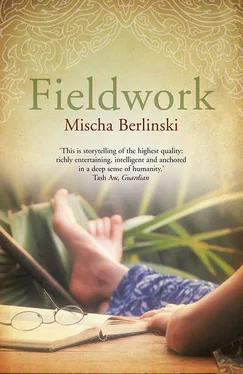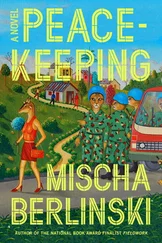"Yes, yes, I think so," I said. How could I say anything else? "You need to let go of bad things."
" Of course you do. In any case, we were very poor here after the war, there wasn't even always enough to eat, but we took them in. Piers couldn't work he was so thin and tired, and Areta didn't work. Piers would go off to the library in the morning, just to get away of the house, and when he'd come back Areta would be waiting for him near the door. She would not say a word, just wait for him — as if she couldn't bear to be out of his sight for a minute. Piers as a boy had a dog like that once, but I don't think he realized how his wife waited for him. But then, whatever he'd say, she'd start a fight, a terrible fight. I remember one time she made rijsttafel for him for lunch as a surprise. He came back from the library, as usual, and in those days he looked so pale even after just a morning out. She ran to him with her usual excitement at his arrival, she was frantic, and announced proudly that she had made lunch for him.
"Piers said something to her. I don't know what he said, but it didn't suit her. I think he had eaten at the university. Areta looked at my brother with those huge round eyes. The disappointment went far beyond lunch. She had made all morning cooking for another man, a man that she had once loved, and my poor brother had taken his body. She was furious with this man who had stolen her lover. And she had nothing else in all the world, absolutely nothing else. She took the plate of rijsttafel and let it drop on the ground. Not angry, the plate just fell from her arms as if she forgot how to carry it. What a mess. Then she went to her bedroom and closed the door. When Piers went out that afternoon, she came out of her room and started waiting for him again by the door.
"Piers, he had no idea what to do. He tried talking to her and then shouting at her. Had he been a different sort of man he might have hit her. It might have done her some good. But he wasn't that sort of man. I said to send her away, but he couldn't. Piers felt he had a responsibility toward Areta, but I don't think he loved her anymore, at least not the way he used to. He was too tired for that kind of love, we all were. She was too."
"Was Piers still affectionate with her?" I asked. "She must have been very lonely."
" Of course she was lonely …" Elena van der Leun's voice flashed with irritation, and I realized that I had just taken the wrong side in a half-century-old family quarrel. But after a second Elena spoke again. "Piers was not a man very skilled with a woman. It was clear to us, and it must have been clear to her, that he wasn't as passionate about her as he once was. Who would have been? Finally, Piers got well enough to think about work. The university awarded him a grant to return to Indonesia and continue his studies, and he accepted. Areta seemed happy about the move. She spoke about how excited she was to get back to the East. We were sad to see Piers go, but not sorry to say goodbye to the couple. Six months later, Martiya was born."
Not long ago, I spent five days on an old barge floating down the Mekong toward the ancient holy city of Luang Prabang, alone with a Lao crew, the only other passenger a Dutch electrical engineer named Dirk, another tourist. I spoke no Lao and would have been content with silence, but day after day I was forced to endure long lectures on the Dutch welfare state, and the superiority of Dutch electro-engineering, Dutch social policy, Dutch drug policy, Dutch foreign policy, and Dutch policing to their American counterparts. An immensely wide, open sky filled the night; the river rushed on to Vietnam and the South China Sea from mystical Tibetan headwaters; and life would have been strange and weird and wonderful, altogether thrilling, if only Dirk had stopped prattling on about the ease with which a competent Dutch engineer (such as himself) could hook up a generator and set running lights aboard the boat. Before Areta is entirely dismissed as lunatic, hysterical, or wicked, let it be said in her defense that the practical, kindly Dutch can be unbearably irritating, as everyone who has had intercourse with them will testify. Irritation over time, more so even than cruelty, can mount to madness.
Poor Areta! Installed in that damp little hut in a Tobaku village on the edge of the ebony forest, did Piers lecture her on the temporal sequence of conditional clauses in Tole'e? Did he whistle tunelessly while he wrote in his lexicon of Pipikoro words, as the rain hemmed them in like prison bars? Did he suggest she take long walks and learn the native names of flowers? I tried to find somebody who could testify to what she might have suffered over the next few years, trapped in a cabin on the edge of the wilderness with what everyone described as a very nice Dutch man. But there was no one. Her father was murdered by the Japanese. A few relatives survived the war, but they didn't survive the turmoil of independence and the Communist purges. Perhaps there is someone else somewhere out there who personally remembers Areta van der Leun besides her sister-in-law Elena, but I could not find that last remaining witness.
Martiya van der Leun always told friends that she had a wonderful early childhood in the jungle village. Every woman was her mother, and every lap was open to her. Her stories are like all early childhood stories, disjointed, dreamlike. She had a dog named Pue', which means ghost. He was a black dog and very fluffy. Once, she stole a coconut from a little boy and ran into the forest to hide. Pue' was with her, and she grew very scared. She spent a night alone in the forest with Pue', and the village headman found her in the morning. Then the shaman was called, to see if she was really alive or had died in the night and was only a spirit. Everyone in the village was very happy that she was alive and not a phantom, and there was a feast, and the villagers ate the big pig that she had loved. Once, she cut her toe and her father and mother took her to the hospital in Palu. In Palu, she had ice cream for the first time, and cried because she wasn't allowed to bring ice cream home to her friends in the village.
Every year there were six months hard rain, and even Martiya knew her mother was unhappy. Her father smoked a pipe and wrote lexical tables and then wandered to the village headman's house to drink rice whiskey or palm wine; her mother paced the house. She dressed Martiya in all her clothes and played frantic games of dress-up: she told Martiya the terrifying story of Sita and Ravana, and kidnapped Martiya from the veranda to the bedroom. They put Pue' in a cape and called him Rama, but Pue' was too dirty to be allowed in the house, and Sita was forced to rescue herself. Areta never learned Uma well and took Martiya with her to the big village down the road to negotiate on market day. Areta would smoke clove cigarettes and give Martiya a fistful of rupiah. The five-year-old girl would wander from market stall to market stall, buying cassava and taro and chili peppers and eggs. She handed over all her money to the Chinese merchant, who took what he wanted and handed her back the rest. Her mother had told her not to buy from the Chinese, but the Chinese always gave her a piece of sugarcane. The merchants all knew that she was the tuan 's child and always charged her white man's prices. She would walk with her mother under the huge umbrella in the rain back home, their sandaled toes slipping in the mud. Areta sometimes told Martiya about the house in Penang in which she grew up, with hardwood floors covered in rugs and an entire library of books and a globe that spun on a copper base. A real English house! Her father was a sultan's brother! Once, as a child, Areta had decided that she wished to play the gamelan. Her father arranged lessons for her. Her teacher was old and Hindu, and arrived at the house dressed in a perfectly white dhoti. Although she was not a Hindu, of course, he began every lesson with a Sanskrit prayer, which she repeated, and he kissed the instrument before playing. Areta became quite competent at the gamelan. Now, of course, she would not remember the fingerings, but she hoped that Martiya would have the opportunity to play an instrument — not one of the crude pipes they played in the village, but something with which she might make real music.
Читать дальше












